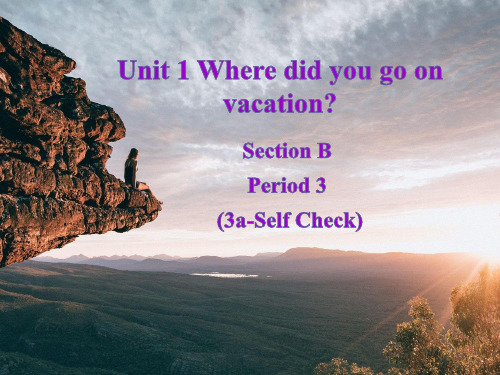八年级英语上册Unit1Wheredidyougoonvacation写作小专题习题课件人教新目标版
- 格式:ppt
- 大小:1.29 MB
- 文档页数:12

Unit 1 Where did you go on vacation? 作文范文假如你是李华,你的外国朋友Tom将要来中国旅游,希望你跟他分享你的一次旅行经历。
请你用英语给他写一封信。
内容包括:(1)旅行的时间、地点和交通方式;(2)旅途中的活动;(3)你的感受Dear Tom,I am glad to hear that you are coming to China for vacation! China is a big country and you can visit a lot of beautiful places here.I went to Guangzhou for vacation this summer. The trip was wonderful!It was a sunny day. My parents and I took the train to Guangzhou. It only took us 30 minutes! We visited Guangzhou Zoo first. There were many animals in the zoo. I liked the pandas best, because they were very cute! Then we had lunch at a local restaurant. The food was very delicious, and it was not expensive!After lunch, we went shopping. There are a lot of shopping malls in Guangzhou. You can find anything you want! I bought some gifts for my best friend. I also took a lot of photos.You can visit Guangzhou, too! I hope you will enjoy your trip!Yours,Li HuaUnit 2 How often do you exercise? 作文范文最近,某中学英文报开设了“After-Class Activities at School”栏目,假如你是王明,请你写一篇文章给该栏目投稿,介绍你们学校开展的课外活动。

八年级上Unit1 Where did you go on vacation?go on vacation去度假stay at home待在家里go to the mountains去爬山go to the beach去海滩visit museums 参观博物馆go to summer camp去参观夏令营quite a few相当多study for为……而学习go out出去most of the time大部分时间taste good尝起来很好吃have a good time玩得高兴of course当然feel like给……的感觉;感受到go shopping去购物in the past在过去walk around四处走走because of因为one bowl of…一碗……the next day第二天drink tea喝茶find out找出;查明go on继续take photos照相something important重要的事up and down上上下下come up出来buy sth. for sb. / buy sb. sth.为某人买某物taste + adj. 尝起来……look+adj. 看起来……nothing…but+动词原形除了……之外什么都没有seem+(to be)+ adj. 看起来……arrive in+大地点/ arrive at+小地点到达某地decide to do sth.决定去做某事try doing sth.尝试做某事/ try to do sth.尽力去做某事forget doing sth.忘记做过某事/ forget to do sth.忘记做某事enjoy doing sth.喜欢做某事want to do sth.想去做某事start doing sth.开始做某事stop doing sth. 停止做某事dislike doing sth. 不喜欢做某事keep doing sth.继续做某事Why don’t/didn’t you do sth.?= Why not do sth.? 为什么不做……呢?so+adj.+that+从句如此……以至于……tell sb. (not) to do sth. 告诉某人(不要)做某事1.We decided (go) to the beach near our hotel.2.I really enjoy (walk) around the town.3.We wanted (walk) up to the top.4.My family (go) to the beach every summer.5.Did you have a great time (talk) in groups?6. Lucy usually_ ______to school early. But today she ________to school late. (go)7.Our teacher often keeps us (read) English in the morning.8. It’s very interesting _____ ( feed) the pets.9.唯一的难题是在晚上除了读书没有什么可做的。


2013八上英语Unit1Wheredidyougoonvacation第一篇:2013八上英语Unit1Where did you go on vacation Unit1Where did you go on vacation?anyone ['eniwʌn] pron.任何人anywhere ['eniweə(r)] adv.任何地方n.任何(一个)地方wonderful ['wʌndəfl] adj.精彩的;极好的few [fjuː] adj.很少的;n.少量most [məʊst] adj.最多的;大多数的;something ['sʌmθɪŋ] pron.某事物;nothing(=not…anything)['nʌθɪŋ]pron.没有什么n.没有myself [maɪ'self] pron.我自己everyone ['evriwʌn] pron.每人;人人yourself [jɔː'self] pron.你自己;你亲自hen [hen] n.母鸡;雌禽bored [bɔːd] adj.无聊的;厌烦的;郁闷的pig n.猪diary ['daɪəri] n.日记;日记簿(keep a diary)seem [siːm] vi.似乎;好像someone ['sʌmwʌn] pron.某人;有人quite a few相当多;不少(后接可数名词)of course [əvkɔːs] 当然activity [æk'tɪvəti] n.活动;活跃decide [dɪ'saɪd] v.决定;选定(decide to do sth.)try [traɪ] v.尝试;设法;努力(try to do sth./try doing sth.)bird [bɜːd] n.鸟;禽paragliding ['pærəɡlaɪdɪŋ] n.空中滑翔跳伞bicycle ['baɪsɪkl] n.自行车building ['bɪldɪŋ] n.建筑物trader ['treɪdə(r)] n.商人;商船wonder ['wʌndə(r)] v.惊奇;想知道;怀疑difference ['dɪfrəns] n.差异;不同top [tɒp] n.顶部;顶wait [weɪt] v.等;等待(wait for)umbrella [ʌm'brelə] n.伞;雨伞wet [wet] adj.湿的;雨天的below [bɪ'ləʊ] prep.低于;在...下面adv.在下面as [əz] conj.如同;像...一样enough [ɪ'nʌf] adj.足够的adv.足够地;充分地duck [dʌk] n.鸭肉;鸭hungry(反full)['hʌŋɡri] adj.饥饿的;渴望的feel like(doing sth.)想要dislike [dɪs'laɪk] v.不喜欢;厌恶n.不喜爱;厌恶;反感because of因为;由于have a good time=enjoy oneself=have fun(doing sth.)玩得痛快第二篇:八上英语教学计划八年级英语教学计划(2012—2013学年上学期)金春萍在新的学期里,为了更好、更出色的完成本学期的教学任务,特将本学期教学工作计划制定如下:一、本学期教学指导思想:在本学期的英语教学中,坚持以下教学理念:1、面向全体学生,关注每个学生的情感,激发他们学习英语的兴趣,帮助他们建立学习的成就感和自信心,培养创新精神;2、整体设计目标,体现灵活开放,目标设计以学生技能,语言知识,情感态度,学习策略和文化意识的发展为基础;3、突出学生主体,尊重个体差异;4、采用活动途径,倡导体验参与,即采用任务型的教学模式,让学生在老师的指导下通过感知、体验、实践、参与和合作等方式,实现任务的目标,感受成功;5、注重过程评价,促进学生发展,建立能激励学生学习兴趣和自主学习能力发展的评价体系。

Unit 1 where did you go on vacation?【例文展示】假如你是王杰,上周末你和父母去乡下旅行。
请你给美国笔友Joe发一封电子邮件,向他介绍一下这次乡下之旅。
提示:1.在乡下旅行时做了什么; 2.你在这次旅行中的感受;要求:70〜100词,可适当发挥。
电子邮件的格式已给出,不计入总词数Dear Joe,Last weekend, I went to the countryside with my parents. It was sunny and we went there by bus. When we got there,we were very excited. The air there was fresh and we could hear birds singing in the trees. We did lots of things there. We visited a farm and climbed the hills there. And we took lots of photos. We also tasted some special farm food there. It was really delicious. I think the life there is relaxing. I can’t wait to go there again.Yours,Wang JieUnit 2 how often do you exercise?Students now have more free time.Here is a survey about how the students in our school spend their weekends.I find that 35%of the students do their homework at home on weekends. 25 % of them spend time watching TV or listening to music. 12% of them like to chat online or play computer games, While 20% of them help their parents do housework. Only 8% of them go outside to play sports or travel.I think students should have a plan for weekends. We should learn to relax,but don’t spend too much time in watching TV or chatting online.Unit 3 I’m more outgoing than my sister.【例文展示】亲爱的同学,在这段时间的学习生活中,你一定结交了许多的好朋友。

八年级英语第一次课-Unit 1-Where did you go on vacation?重要知识点讲解【一览无余】考点一Where did you go on vacation?含有行为动词的一般疑问句与特殊疑问句的区别与构成区别:一般疑问句是用来询问事情的真实性,所以一般情况下有两种回答方式:Yes,...或No,...。
而特殊疑问句是具体的对句中的某一成分进行提问,所以回答时,不能用Yes,...或No,...来回答,而应回答出具体的内容。
E.g. -Did you go to the Great Wall on vacation? -Yes,I did./No,I didn’t.-Where did you go on vacation? -The Great Wall./I went to the Great Wall.构成:陈述句:I went to the Great Wall with my mother by bike on summer vacation.①②③○4.一般疑问句:Did you go to the Great Wall with your mother by bike on summer vacation?特殊疑问句①:Where did you go with your mother by bike on summer vacation?(补全对话常用句)特殊疑问句②:Who did you go to the Great Wall with by bike on summer vacation?特殊疑问句③:____________________________________________________?特殊疑问句○4.:____________________________________________________?考点二Did you buy anything special? 你买了一些特别的东西吗?识记:不定代词something 一些事情(用于)、anything 一些事情(用于)、everything 所有事情nothing 没有事情somebody/someone 一些人(用于)、anybody/anyone 一些人(用于)、everybody/everyone 所有人nobody/no one 没有人用法:(1)不定代词用作主语时,谓语动词用单数:Something is wrong with my bike. 我的自行车出了些问题。
人教版新目标八年级英语上册课文翻译集团标准化办公室:[VV986T-J682P28-JP266L8-68PNN]八年级上册参考译文Unit1WheredidyougoonvacationSectoinB2b7月15日,星期一1.今天早上我和家人抵达马来西亚槟城。
2.天气晴朗炎热,于是我们决定去宾馆附的海滩。
3.我和姐姐尝试了滑翔伞运动,我感觉自己就像一只鸟。
这太令人兴奋了!4.午饭我们吃了非常特殊的东西——马来黄面,可真是好吃呀!5.下午,我们骑自行车去了乔治市。
6.如今那里有许多新的建筑,但是许多老房子依然还在。
7.在乔治市的一处古老的地方——海墘街,我们看到了一百年前中国商人们的房子。
8.我在想这里过去的生活是什么样子呢。
漫步在乔治市真是很享受。
7月16日,星期二9.一天的差异是多么大呀!10.我和爸爸决定今天登槟城山。
11.我们本想徒步到山顶,但是天下起了小雨,于是我们决定乘坐火车。
12.因为人太多,我们等了一个多小时的火车。
13.当我们到达山顶的时候,雨下得很大。
14.我们没有带雨伞,结果我们(被淋得又湿又冷,真实糟透了!15.并且因为糟糕的天气,底下的东西我们什么都看不到。
16.爸爸没有带足够的钱,所以我们只吃了一碗米饭和鱼。
因为我太饿了,饭的味道尝起来还真是不错Unit2Howoftendoyouexercise?第五中学的学生们在课余时间做什么?17.上个月,我们询问了我们的学生一些有关课余活动的问题。
18.我们的问题是有关锻炼、使用网络,以及看电视。
以下是所获得的结果。
19.我们发现我们的学生中只有百分之十五每天锻炼。
百分之四十五的学生一周锻炼四至六次。
百分之二十的学生一周只锻炼一至三。
还有百分之二十的学生根本就不锻炼!20.我们都知道许多学生经常上网,但是让我们惊讶的是,有百分之九十的人每天使用网络,另外百分之十的学生每周至少使用网络三至四次。
绝大多数学生上网娱乐,并非为了做功课。